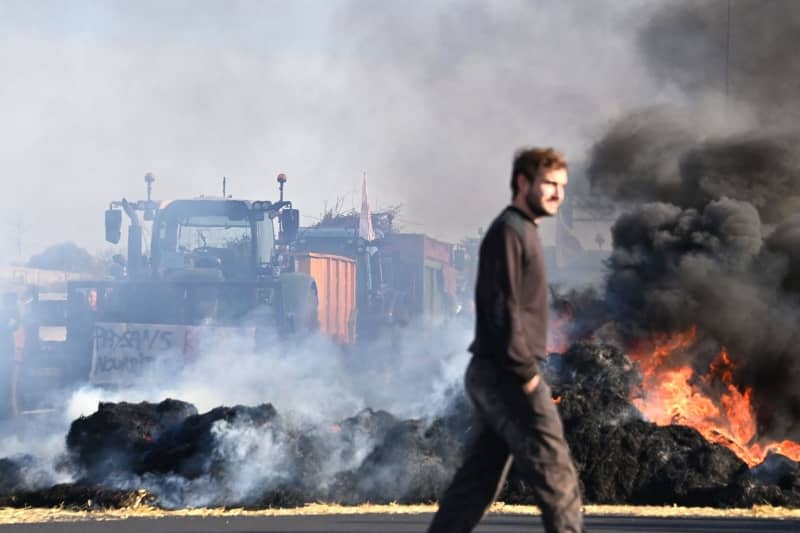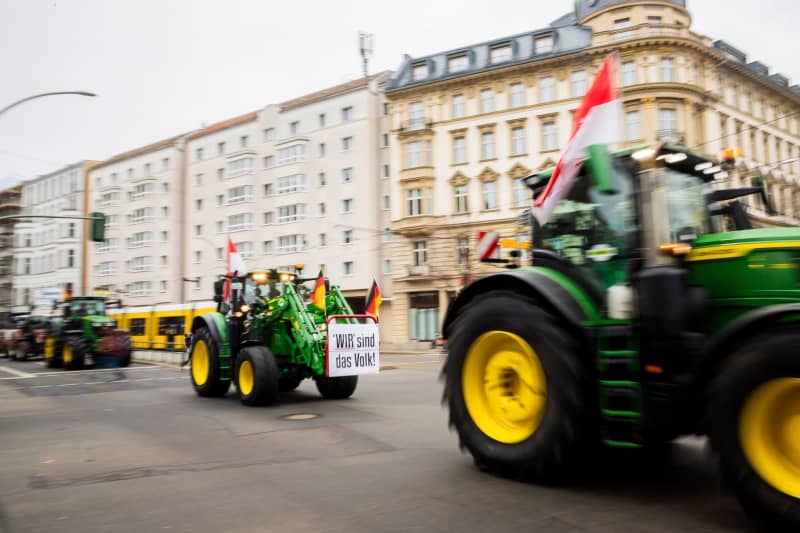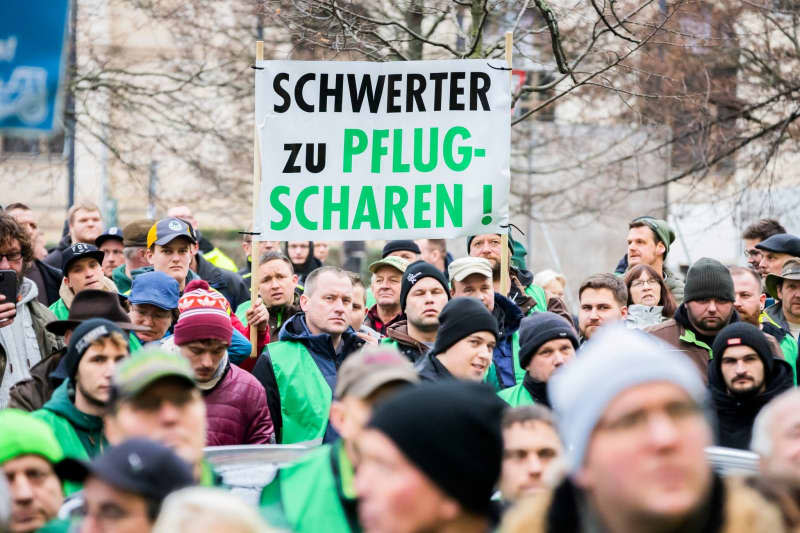Price crisis, EU laws anger farmers across Europe

- Oops!Something went wrong.Please try again later.
- Oops!Something went wrong.Please try again later.
Europe’s farmers are in revolt and their anger is growing: The fury has led to road blockages and tractor parades in the past few weeks, with farmers taking their protests to the streets of France, Germany, Lithuania, Poland and Romania - and the Netherlands before that.
While farmers have protested over national issues, they are united by concerns at increasing challenges including extreme weather, bird flu and surging fuel costs.
Another source of discontent is what farmers call excessive regulation, also on the European level. Then there is the influx of Ukrainian agricultural products into the European Union since the lifting of customs duties in 2022. The European Commission must soon say if it intends to renew the customs exemption, which expires in June.
The agricultural question is important, in light of European Parliament elections in June and surveys showing a surge of the far-right and nationalists who are fervent about agricultural issues.
Farmers are a “very important electorate,” said EU lawmaker and vice-president of the parliament’s socialist grouping, Pedro Marques.
On Thursday, European Commission President Ursula von der Leyen – seeking to defuse the anger – launched a new strategic dialogue format that brings together farmers, environmental organizations and industry to develop solutions to the problems of agriculture in Europe. According to the commission chief, everyone agrees the challenges are increasing.
Among the main issues are topics such as farmers’ income, sustainability, technological innovation and competitiveness. These were also discussed at a meeting of EU agriculture ministers on Tuesday. Concerns that the transition to a green economy will wreak further havoc for farmers are also part of the programme.
The dialogue at EU level aims to achieve a common vision by mid-2024 and present this to the commission. The initiative, only confirmed at the end of last week, was promised by von der Leyen in September, calling for “less polarization” and assuring that agriculture and the protection of the environment could go hand in hand.
Powerful farmers' union Copa-Cogeca said it was a “welcome initiative, albeit one which has been slow to materialize,” adding that “the scope of the discussions remains particularly vague.”
PROTESTS ACROSS EUROPE
A day prior, on January 24, demonstrations were held in front of the European Parliament in Brussels. “The demonstrations will grow because discontent is growing and this will affect the European elections,” French farmer Stéphane Bleuzé said. “We came to Brussels because this is where the rules that affect us are decided.”
Marion Maréchal, who will lead the French right-wing Reconquête (Reconquest) movement in the European elections and is the niece of Marine Le Pen, attended the Brussels protest.
The Flemish trade union Algemeen Boerensyndicaat (ABS) said that “today’s action is yet another cry for help” and that “farmers don’t ask for much, just to fulfil their social role and to be treated fairly.”
In Germany, meanwhile, angry farmers have for weeks been protesting diesel fuel subsidy cuts, including with mass demonstrations in several cities in which farmers blocked traffic with tractors and other pieces of farm equipment.
The government agreed to soften the measure by phasing out the diesel fuel subsidy over three years, instead of immediately, but has otherwise stuck by the policy. Chancellor Olaf Scholz’s coalition has been under pressure to raise tax revenue or cut spending to close a major budget gap.
The nationwide farmers’ protests sparked a discussion about the extent to which farmers are being exploited for the interests of far-right parties.
In neighbouring Austria, where citizens will vote in national elections in autumn, the right-wing FPÖ organised a farmers’ demonstration last week. The farmers’ association of the conservative ÖVP, in response, criticised that the party was “instrumentalizing the farmers for its own party purposes” and distanced itself from the “election campaign games at the expense of the farmers.”
In France, the growing anger of farmers is shaping up to be the first major challenge of President Emmanuel Macron’s newly appointed government.
Prime Minister Gabriel Attal paid tribute to the country’s agriculture sector last weekend, responding to the growing discontent of farm workers. A reform package designed to meet some grievances has been postponed for fine-tuning.
EU lawmaker Jordan Bardella who will lead the far-right National Rally into the June elections claimed there is growing anger against “the European Union and the Europe of Macron,” who - according to Bardella - wants “the death of our agriculture.” Some political observers think it could pose a major challenge to French mainstream parties.
In recent months, similar exasperation has also spread to Poland, Romania, Slovakia, Hungary and Bulgaria, where producers denounce what they consider unfair competition from Ukraine, undercutting the price of their cereals.
Following the Russian invasion of Ukraine, the export of Ukrainian agricultural products through so-called Solidarity Lanes created disruptions in the internal markets of those countries.
In Poland, protests led to the resignation of the agriculture minister in April. In November, Polish operators began to block the crossing points with Ukraine, along with truckers. Farmers suspended their blockade on January 6 after an agreement with the Polish government.
In Romania, farmers’ and transporters’ protests began on January 7. Hundreds of tractors and trucks blocked border traffic, making it difficult for grain trucks from Ukraine to enter the country. The farmers demand compensation for the losses caused by the major disruption of the grain market following the import of cheap grain from Ukraine, which, they claim, does not comply with EU standards.
On January 21, Bulgarian Agriculture Minister Kiril Vatev and Prime Minister Nikolay Denkov met the National Grain Producers Association and the Bulgarian Agrarian Chamber to discuss the status quo and avoid potential future protests. Farmers had rallied in Sofia in November.
The protests could have a contagious effect: “The Italian and Spanish [agricultural unions] are also talking about demonstrations,” says the president of the EU's Copa trade union, Christiane Lambert.
The Slovenian Farmers' Trade Union urged the new Minister of Agriculture, Mateja Čalušić, to meet demands they had addressed to the government during protests last spring. “Some solutions have to be offered, because if they are not, farmers are calling on us to follow in the footsteps of German protests,” according to the union.
In Vilnius, the Lithuanian capital, several thousand farmers with 1,300 tractors gathered this week for two days to demand better prices, lower taxes on fuel, simplification of regulations and a ban on the transit of Russian grain through their country.
COURTING AN IMPORTANT ELECTORATE
Less than five months before the European elections and many national polls, the protesting farmers and agricultural producers are fuelling the campaign fires. Political parties are already courting the farmers’ vote.
Agriculture makes up 11% of greenhouse gas emissions in Europe. As part of the so-called Green Deal, the commission has launched several projects under von der Leyen’s leadership. Last year, for example, there was great displeasure over a nature conservation law that also affects the use of agricultural land. Bans on pesticides cleared for use in other parts of the world are a further source of farmers’ discontent.
Their discontent has been a growing concern in the European Parliament. The centre-right EPP, the largest parliamentary grouping and von der Leyen's political home, has often sought to water down agricultural texts, arguing it represents farmers’ wishes.
“We share the green ambition but it must be adapted to the economic situation. Agricultural prices are falling, expenses are skyrocketing," said EPP lawmaker Anne Sander, arguing that adding further regulatory efforts was "too much."
“There’s a perception that the centre-right and the far-right are trying to create in the farmers that the green transition, those that choose the green transition, are going against them,” EU lawmaker Marques said.
But he recognized the need to provide support, especially as the EU prepares to debate its ambitious 2040 climate targets, which will involve a costly decarbonization of the agricultural industry.
The content of this article is based on reporting by AFP, ANSA, AGERPRES, APA, BTA, dpa, EFE and STA as part of the European Newsroom (enr) project.



